Energy, global minimum tax issues top government-corporate dialogue
Energy development policies and the impact of the Global Minimum Tax (GMT) were two of the issues that took center stage at a meeting between Vietnamese government leaders and foreign corporate representatives on Saturday.
The meeting was hosted by Prime Minister Pham Minh Chinh, with Deputy PMs Le Minh Khai and Tran Luu Quang attending together with Minister of Planning and Investment Nguyen Chi Dung.
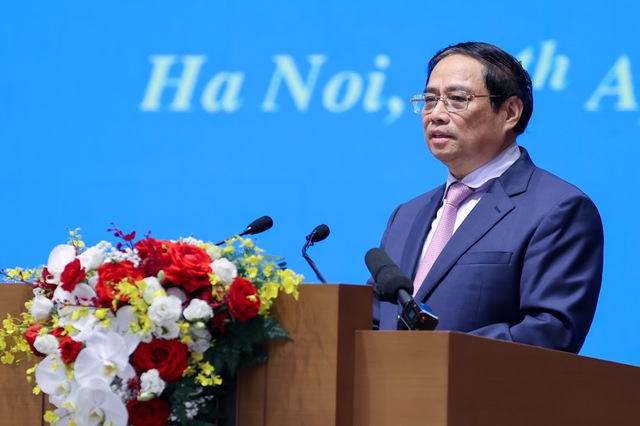
Prime Minister Pham Minh Chinh. Photo courtesy of the government portal.
VBF suggestions
Nitin Kapoor, co-chairman of the Vietnam Business Forum (VBF) and chairman of AstraZeneca Vietnam, said the VBF should have representation at existing energy transition working groups in the country, such as the secretariat of the Just Energy Transition Partnership (JETP) and its policy drafting committee.
Regarding tax, Kapoor said it is necessary to study the impact of the GMT on foreign investors and the business environment in Vietnam to be able to provide practical, effective, and timely solutions to replace tax incentives when the GMT takes effect in the country.
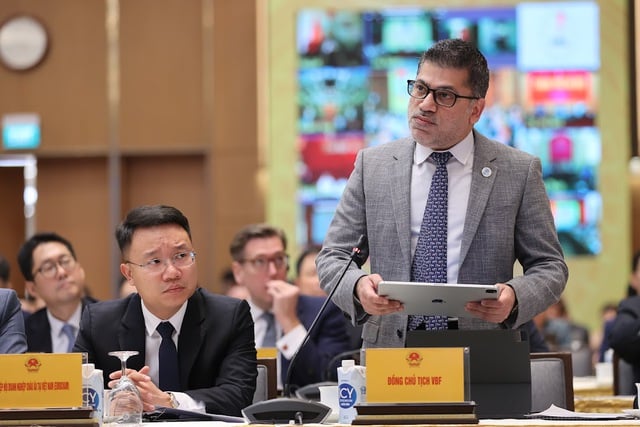
Nitin Kapoor, co-chairman of the Vietnam Business Forum. Photo courtesy of the government portal.
Referring to the ailing property market, the VBF co-chairman said a series of measures already taken by the government, including controlling corporate bonds, are expected to revive market confidence.
“We believe that people's confidence will come back and the market will soon return to the way it was,” he said.
Energy storage development
Greg Testerman, chairman of AmCham Vietnam in Ho Chi Minh City, said the chamber hopes Vietnam will promote investment in wind power, offshore solar power, and battery storage systems.
“However, our member businesses still have concerns about the instability in Vietnam's electricity policy and want Vietnam to speed up the licensing process for clean energy projects.
“This will quickly have a positive impact on the competitiveness of Vietnam's energy industry. We also hope that Vietnam will soon approve Power Plan VIII as many foreign investors are waiting for this,” Testerman added.
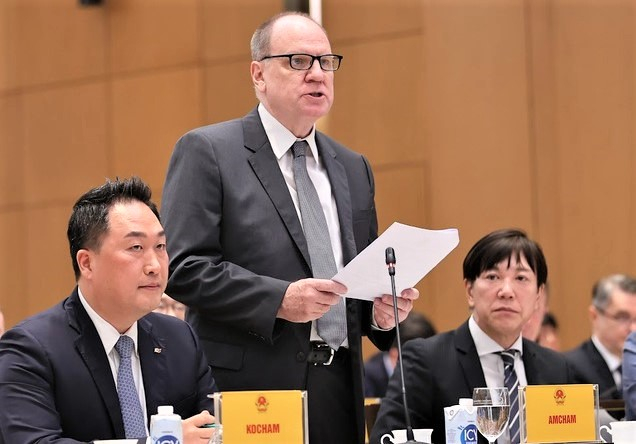
Greg Testerman, chairman of AmCham Vietnam in Ho Chi Minh City. Photo courtesy of the government portal.
Power development plan VIII
EuroCham chairman Gabor Fluit said Vietnam is a rising star in business and investment, but the implementation of its clean energy development strategy has not been as fast as expected. He was referring to the country’s latest draft power development plan.
“We need to speed up the completion of the draft PDP VIII in order to carry it out promptly,” he said.
“Vietnam should also have direct power purchase agreements to encourage renewable energy producers. Especially, factories in industrial parks should be allowed to get direct PPAs. We propose favorable conditions for factories that wish to use renewable energy to meet compliance requirements from the EU,” Fluit stated.
In terms of the circular economy Vietnam is pursuing, the EuroCham chairman said: “We recommend the application of the norms of recycling costs for businesses, in which businesses using high-value recycled materials should get some deduction from the post-recycle value.
“Vietnam should intensify fines against violations of waste regulations while promoting the use of alternative materials such as biodegradable plastics as a key waste reduction measure.”
For tourism, he recommended Vietnam extend visa-free entry to all EU member states, opening the door wider to high-spending tourists and facilitating investment flows in the near future.
In healthcare, Fluit said EuroCham emphasizes improving access to pharmaceuticals and medical devices through optimized management processes and global best practices. This requires value-based financing and procurement policies to be revised by the Pharmacy Law.
Regarding taxes and fees, EuroCham welcomes the government's decision to extend tax payment terms and reduce value-added tax.
“Vietnam needs to introduce appropriate and competitive preferential policies to attract investment as the GMT is implemented. In addition, balancing administrative procedures and tax policies is very important to promoting trade growth within the EU-Vietnam Free Trade Agreement framework.”
He said EuroCham also recommends exemptions or reductions of excise tax on environmentally friendly industrial products such as electric vehicles. The government may consider applying a mixed excise tax system for wines and spirits but should not impose excise taxes on essential products like milk and nutritional supplements.
In terms of digital transformation, the EuroCham chairman said this should include the digitization of services and promoting the use of modern technologies such as cloud computing, automation, and artificial intelligence.
Investing in cleaner electricity
Like the VBF and EuroCham representatives, Preben Elnef, vice president and general manager of Lego Manufacturing Vietnam, said Vietnam should facilitate enterprises investing in generating cleaner electricity. He added that Lego Group is shifting to using cleaner energy globally, and the smart and green manufacturing factory Lego is building in Binh Duong province is the group’s first carbon-neutral production site worldwide, to be followed by others.
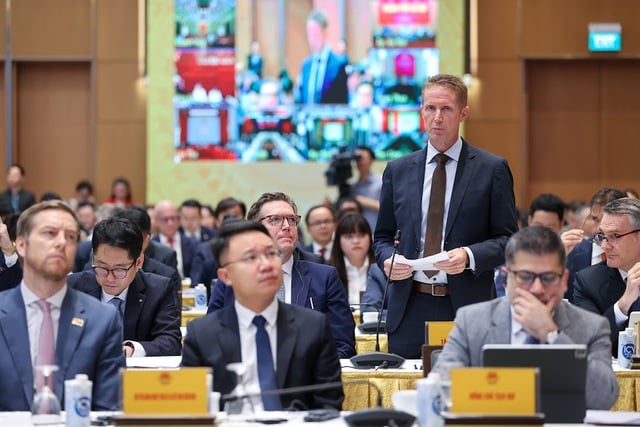
Preben Elnef (standing), vice president and general manager of Lego Manufacturing Vietnam. Photo courtesy of the government portal.
Elnef also said the transparency and predictability of the business environment is very important to foreign investors, and sudden changes in policy without adequate notice or overstepping regulations should be avoided.
He recommended the government continue to invest in developing human resources in the economy and education services for all generations.
“At the same time, we suggest the government continue to invest in infrastructure - the backbone of the economy. A country with a developed and efficient transport network will make contributions to socio-economic growth and development.”
$1.5 bln green stainless steel investment
Antonia Zahn-Weber, CEO of Munich-headquartered VFT Industry UG, said that after conducting market research, VFT has decided to launch a project in Vietnam.
“VFT Industry UG has cooperated with German and Vietnamese enterprises to prepare an estimated $1.5 billion investment in Vietnam capable of producing green stainless steel with an estimated capacity of 600,000 tons per year for the Vietnamese and European markets,” she said.
“Our decision to carry out the project was encouraged by international agreements that Vietnam has signed with the EU and Germany to tackle climate change together.”
Unclear fire prevention rules
Kim Sung Hun, CEO of Amkor Technology Vietnam Company, said Amkor, as a global leading semiconductor company, is developing a high-tech semiconductor manufacturing project in Bac Ninh province, and “construction is going very smoothly”.
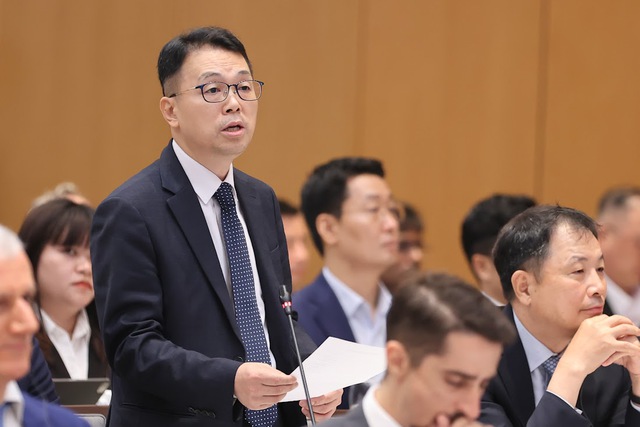
Kim Sung Hun, CEO of Amkor Technology Vietnam Company. Photo courtesy of the government portal.
He said Vietnam needs to rapidly work out proper measures to deal with the impact of the GMT so it can continue to attract FDI.
Regarding fire prevention rules, he said it is necessary to introduce clearer and more detailed regulations, and to ease rules after appraising specific business models in high-tech industries. Vietnam should also provide more effective support in administrative work related to firefighting to help companies.
Hun’s third suggestion was more support for semiconductor technology companies in networking with universities and related organizations to help recruit high-quality personnel.
Restoring 'one-door' scheme
Intel Products Vietnam (IPV) CEO Kim Huat Ooi said American giant chipmaker Intel has invested $1.5 billion in Vietnam and contributed $75 billion to the country’s export value over the past 13 years, while creating more than 7,000 high-tech jobs.
“IPV serves as a significant assembly and test facility of Intel and we expect more growth in Vietnam.”
The facility is located in Ho Chi Minh City’s Saigon Hi-Tech Park, better known as SHTP.
“The SHTP management board used to serve as a one-door service for all tenants, and that was important part of our decision to invest here.
“We hope the one-door scheme will be restored soon to ease the workload necessary for all types of permits such as fire protection, construction, and the environment. I believe the scheme is a great example of a government-business partnership to enable efficient and sustainable growth.”
Investing in human resources
Bosch Group Vietnam CEO Dominik Meichle said Bosch has been present in Vietnam for nearly two decades, employing 6,000 people and operating three high-tech centers.
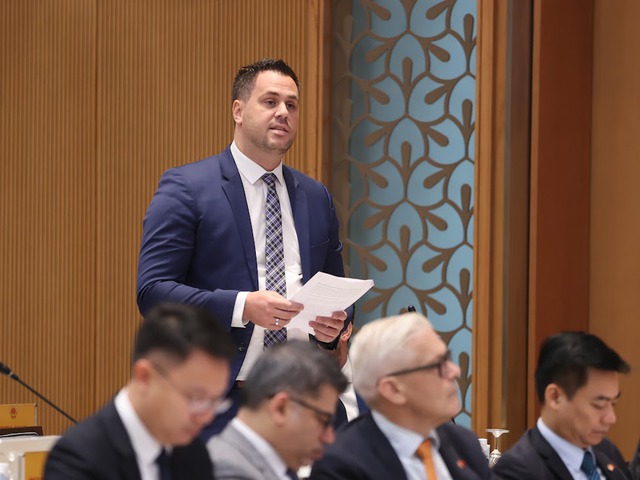
Bosch Group Vietnam CEO Dominik Meichle. Photo courtesy of the government portal.
“Going forward, we will scale up another 6,000 employees in high-quality research and development.
“We will consider expanding into other areas, including high-tech agriculture and logistics. The global economy is going through a tough time with a series of problems and crises, and competition among countries is fierce. However, challenges go hand-in-hand with opportunities. We believe Vietnam will catch the opportunity to emerge.”
Meichle made two proposals, with the first being the government should take an active role in coordinating businesses, academia and stakeholders to promote improvements in human resources development and financing the field.
“We are ready to assist with our experience,” he said.
His second was regarding Vietnam's approach to the GMT, such as providing replacements to current tax incentives so that foreign investors continue to operate here.
New investments in biotechnology, high technology
Korean giant Hyosung, which has so far invested $4 billion in different projects across Vietnam, is considering enormous new investments in the country in areas such as biotechnology, high technology, and information and communications, said Kim Yong Seup, CEO of the Hyosung subsidiary in Dong Nai province.
He said the Korean group expects government support to carry out the new investments as scheduled.
“If we receive the approval or are licensed on time, we can keep our promises to our customers. This will cement our reputation while enhancing the national competitiveness of Vietnam,” he said.
Faster project approval
Masayoshi Fujimoto, president and CEO of Japan’s Sojitz Corporation, told the business meeting that the government should act faster in the approval process for foreign-invested business projects.
“We are committed to working with the Vietnamese Government to reduce carbon emissions to zero by 2050,” he said.
In Vietnam, Sojitz is building the Son My 1 LNG-fired power plant in the south-central province of Binh Thuan and carrying out gas distribution projects to minimize reliance on coal. It is also involved in rooftop solar developments to expand renewable energy sources.
Renewable energy initiatives in IPs
To support Vietnam’s carbon neutrality goal by 2050, Hans Kerstens, an executive of the developer of Deep C Industrial Parks, said Vietnamese policies should encourage IP developers to carry out renewable energy initiatives to replace traditional power sources.
Many provinces have not allowed IP developers to set up their own power distribution units. “Therefore, clearer instructions for this issue would be much appreciated,” he said.
He added Deep C is eyeing support from national- and local-level officials for its planned project in Hai Phong where it wants to build a solar power farm at the Dinh Vu dumpsite area to supply electricity to industrial parks. The project would include effective solutions to treat waste, emissions, and water from the site.
- Read More
MIK Group withdraws from Hanoi's $32.49 bln Red River Scenic Boulevard project after groundbreaking ceremony
Vietnam’s MIK Group has asked to withdraw from the Red River Scenic Boulevard project in Hanoi and transfer all of its rights and obligations in the investor consortium to Dai Quang Minh Real Estate Investment JSC.
Real Estate - Thu, December 25, 2025 | 10:26 pm GMT+7
Vingroup withdraws from Vietnam North-South high-speed rail bid
Vingroup has withdrawn its registration to invest in Vietnam's North-South high-speed railway project, saying it wants to concentrate resources on other strategic infrastructure and energy projects.
Infrastructure - Thu, December 25, 2025 | 4:37 pm GMT+7
Vietnam sees about 785,000 successful real estate transactions annually since 2022
Vietnam’s real estate market has gradually recovered and resumed growth since 2022, with annual transactions reaching 537,000-785,000, according to the Ministry of Construction.
Real Estate - Thu, December 25, 2025 | 3:54 pm GMT+7
Vietnam PM orders resolution of bottlenecks at GS Energy-backed LNG projects
Prime Minister Pham Minh Chinh has directed authorities to resolve outstanding obstacles facing the Long An LNG I and II power projects, worth a total of $3.13 billion and backed by South Korea’s GS Energy, as the government seeks to accelerate large-scale energy investments nationwide.
Energy - Thu, December 25, 2025 | 3:25 pm GMT+7
Deo Ca Group withdraws from Hanoi’s gigantic project Red River Scenic Boulevard, cites focus on core expertise
Deo Ca Group, a major Vietnamese infrastructure developer, said it has decided to withdraw from participation in Hanoi’s Red River Scenic Boulevard project, despite being among the first companies to help bring the long-delayed scheme off the drawing board.
Real Estate - Thu, December 25, 2025 | 2:09 pm GMT+7
Vietnam banks hold extraordinary shareholder meetings for management shake-up
Several Vietnamese banks have convened extraordinary general meetings of shareholders (EGMs), signalling a broader phase of management restructuring and strategic realignment as the sector prepares for a new growth cycle in 2026.
Banking - Thu, December 25, 2025 | 12:28 pm GMT+7
Vietnamese agri major Loc Troi’s predicament ahead of partnership with TTC AgriS
TTC AgriS, a leading sugar maker in Vietnam, and Loc Troi Group, a major agricultural service supplier and producer, have agreed to cooperate in a bid to upgrade the country’s rice industry. But Loc Troi is entering the partnership amid the most severe crisis in its history and faces an urgent need for substantial financial support.
Companies - Thu, December 25, 2025 | 8:37 am GMT+7
Korean textile maker Panko Vina to shut Vietnam operations from Feb
Panko Vina Co Ltd, a South Korean textile manufacturer, will cease all production and business operations in Vietnam from February 1, 2026, ending more than 23 years of operations in the country.
Companies - Wed, December 24, 2025 | 9:13 pm GMT+7
Vietnam's garment giant Vinatex posts second-highest profit in 30 years despite trade headwinds
Vietnam National Textile and Garment Group (Vinatex), the country's top garment maker, expects consolidated profit to reach VND1,355 billion ($51.5 million) in 2025, the second-highest result in its 30-year history, despite mounting global trade and cost pressures on the industry.
Companies - Wed, December 24, 2025 | 5:03 pm GMT+7
Finding a new balance
The State Bank of Vietnam's proactive and flexible monetary policy in 2026 is expected to maintain market operations within a stable range. For businesses, particularly those in the external sector, it remains essential to proactively hedge against exchange rate and interest rate risks to protect their bottom line, writes Vu Binh Minh, associate director, FX Trading, MSS, HSBC Vietnam.
Consulting - Wed, December 24, 2025 | 4:47 pm GMT+7
Thai giant Central Retail sells Vietnam electronics business to Pico for $36 mln
Thailand’s Central Retail has announced the sale of its Vietnamese electronics retail business to local retailer Pico Holdings JSC for nearly THB1.14 billion ($36 million), as it sharpens its focus on core businesses in the country.
Companies - Wed, December 24, 2025 | 2:00 pm GMT+7
What should investors reasonably expect from IPO stocks?
Experience from both Vietnam and global markets shows that initial public offering (IPO) stocks rarely deliver immediate gains. However, investors who select companies with solid fundamentals and maintain a long-term holding strategy can be rewarded for their patience.
Finance - Wed, December 24, 2025 | 10:45 am GMT+7
Vingroup completes $325 mln overseas bond issuance
Vingroup, Vietnam's biggest listed company by market capitalization, has completed its international issuance of bonds totaling $325 million, with a 5-year maturity, and listed on Austria's Vienna Stock Exchange.
Finance - Wed, December 24, 2025 | 10:17 am GMT+7
Vietnam's public investment-linked stocks seen benefiting in 2026
Capital flows in 2026 are expected to favor sectors that stand to benefit from Vietnam’s public investment drive, including infrastructure, energy, and construction, market experts said.
Finance - Wed, December 24, 2025 | 9:33 am GMT+7
High gold prices to drive prices of property, goods in Vietnam: Sunhouse chairman
In a scenario where gold prices remain elevated in Vietnam, the real estate market is likely to follow suit, pushing income levels higher and driving up prices across other goods, said Nguyen Xuan Phu, chairman of Sunhouse, a leading home appliance manufacturer, while outlining his 2026-2030 forecast.
Economy - Wed, December 24, 2025 | 8:00 am GMT+7
Malaysia’s economy grows robustly in 2025: IMF
Malaysia has shown notable resilience amid global trade tensions and policy uncertainty, with its economy growing at a healthy pace this year, supported by strong domestic consumption and investment, solid employment growth, and a global upcycle in the technology sector, according to Masahiro Nozaki, Mission Chief for Malaysia at the International Monetary Fund (IMF).
Southeast Asia - Tue, December 23, 2025 | 10:07 pm GMT+7


























